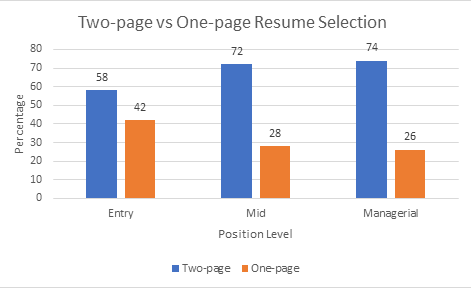Many career coaches and even some resume writing services still recommend going with the conventional wisdom that one-page resumes work best – especially when applying for entry-level jobs or when the applicant’s work experience has been limited mainly to one field or industry. But a recent survey found that hiring officials and recruiters prefer two-page resumes – even for entry level positions.
In October, the resume writing service ResumeGo asked 482 experienced recruiters, hiring managers, human resource professionals and C-suite executives to review and screen one and two-page resumes for a variety of job positions. What the reviewers did not know during the 17-day review period was that it was really a hiring simulation to study the resume review and selection process. To keep the survey as unbiased as possible, each one-page resume per position had a two-page counterpart in which the work experiences, education, skills, security clearance, accomplishments and other pertinent factors in resumes were similar in nature between the two types.
Resume Selection
The survey results are interesting to say the least. Out of the 7,712 resumes selected, 5,375 of them were two-pages in length. HR professionals selected two-page resumes over one-page ones at the rate of 2.3 times to 1. And as the chart below shows, two-page resumes were preferred regardless of the level of the position.
While the selection percentage spread increases with the level of position, even at the entry level the survey participants preferred the two-page resume 1.4 times over the one-page.
Time spent reviewing resumes
Another interesting fact from the survey was that reviewing officials spent almost twice as much time reviewing two-page resumes over the one-page competitors. While conventional resume review wisdom in the past has said that resume reviewers spend little time scanning a resume, this survey found that reviewers spent more time proportionally reading two-page resumes over one-page ones: 4 minutes and 5 seconds compared to 2 minutes and 24 seconds, respectively (both figures strike one as high, but that could be reflective of the study environment vs. an actual hiring situation).
According to the survey, the two-page resumes “summarized the candidate’s work experience and overall credentials better”, thus wanting review officials to spend more time reading the lengthier resumes – it wasn’t simply a matter of more length taking more time to review.
Two-page resumes scored higher
And because a candidate’s experience and credentials were better presented, two-page resumes scored 21% higher than their one-page competition. On a scale of 1 to 10, the breakdown was 8.6 for two-page versus 7.1 for one-page. Further surprising was the fact that reviewing officials did not realize until after the survey that they spent more time – almost twice as much time – reviewing two-page resumes over the one-page counterparts.
Until this survey, there was not any hard data as to why one-page resumes were recommended over longer ones – especially at the entry level. Based on this survey, we now know there is good reason to be guided by content, not length – regardless of the position level.





